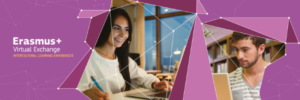- About the Course
- Participants
- Partnership Enquiries
- More about our courses
- Erasmus+ Virtual Exchange
Learn and exchange about the gender-media relationship
In the Interactive Open Online Course ‘Gender In/equality in Media and Journalism’, participants will engage with learning resources and expert content developed by Advancing Gender Equality in Media Industries (AGEMI) while exchanging on different aspects of the gender-media relationship. Through Virtual Exchange, students and young media professionals will put their own experiences, values, and challenges in the forefront as a primary source for learning about gender in/equality in the media.
‘Gender In/Equality in Media and Journalism’ provides an innovative intercultural learning experience for those ready to address one of the pressing challenges of the modern media industries and beyond.
Dates Feb 03 - Mar 06 2020
Duration 5 weeks
Language English
Application deadline Jan 26 2020
What kind of gender norms and stereotypes exists in media industries? How might people with different identities research, analyse, or report on an event or policy differently? What would be different, if anything, if there was more diversity in leadership positions in the media?
In the 5-week Virtual Exchange Course ‘Gender In/equality in Media and Journalism’, participants discuss these and other questions during small, intercultural, facilitated, online group meetings. Inspired by learning resources and expert content they learn with and from each other about different aspects of the gender-media relationship.
Participants gain a grounded understanding of different inequality and intersectional issues including representation and stereotyping employment and working conditions, access to decision-making and leadership positions, the implications of digitalisation for media professions, harassment and abuse in the newsroom, and issues of governance and policy.
Participants do not only exchange, reflect and discuss these topics, but also engage in practice-based assignments where they will create a video- audio- or written report based on community interviews.
Participants
This course is open and free of charge to anyone between 18- 30 years old who is a national of or resident in one of the Erasmus+ Virtual Exchange Project countries.
The application deadline for prospective students is 26 January 2020.
Partnership Enquiries
Interactive Open Online Courses provide youth with the opportunity to learn both with and from their peers across cultural contexts and national boundaries. The facilitated online meetings are organized around relevant skill-building activities and discussing dynamic content provided by expert academics and practitioners.
If you are interested in offering this course to your students, volunteers in your organisation, or other eligible participants, please contact us. We are happy to offer more information and discuss possible partnership arrangements.
More about our courses
Interactive Open Online Courses provide youth with the opportunity to learn both with and from their peers across cultural contexts and national boundaries in facilitated online meetings alongside relevant skill-building activities and dynamic content provided by expert academics and practitioners. These courses combine the deep impact of intercultural exchange with the broad reach of online learning to allow more young people to have meaningful intercultural learning experiences as part of their formal or non-formal education. Interactive Open Online Courses are part of Erasmus+ Virtual Exchange. This project provides an accessible, ground-breaking way for young people to engage in intercultural learning.
An innovative learning experience
Participants in the interactive courses are provided with the opportunity to:
- Engage with youth from different countries, cultures and backgrounds in a virtual classroom;
- Discuss topical themes on technological innovations, social identity and culture;
- Learn from expert content and materials;
- Improve language and communication skills;
- Build 21st-century skills that improve employability, including the ability to work in a virtual and intercultural environment;
- Gain an Erasmus+ digital badge and become an Erasmus+ Virtual Exchange alumni.
Erasmus+ Virtual Exchange
This Interactive Open Online Course is part of the Erasmus+ Virtual Exchange project and as such produced under a contract with the Education, Audiovisual and Culture Executive Agency, financed by the Union’s budget. The opinions expressed are those of the Sharing Perspectives Foundation, our partners and participants only and do not represent the European Commission’s official position.
© 2020 European Union and EACEA. All rights reserved. Certain parts are licensed under conditions to the EU and EACEA.

Course manual
Here you find essential information about the curriculum, assignments and how to earn your badge.
Check out the course manualResources
Review the weekly videos and content in preparation for your online session here and submit your video-lecture comment.
Check out the resourcesOnline meeting room
Click here to login to the Exchange Portal. Here you will find the meeting room for your weekly group sessions.
Login to your meetingroomAssignments
Weekly Preparation Assignment
Prior to your online group meeting each week, watch, read or listen to the week’s materials and then respond to at least one item with a comment, observation or question.
Media focussed assignment
Conduct short interviews and produce a final media-focused assignment alongside group members. In your online groups, you will collectively think up a leading question that you deem important to ask the wider public. As individuals, participants will conduct short interviews in their own communities to answer the question and prepare reporting on this. Your final product can be either video, audio, or written format, with a focus on gender inclusion (Examples: blog post, social media campaign, photo series, article, video feature, etc.) It will be presented back to your group in the final week. See some examples of past participants here, here and here.
Submit your final product PRIOR TO YOUR LAST ONLINE GROUP MEETING



